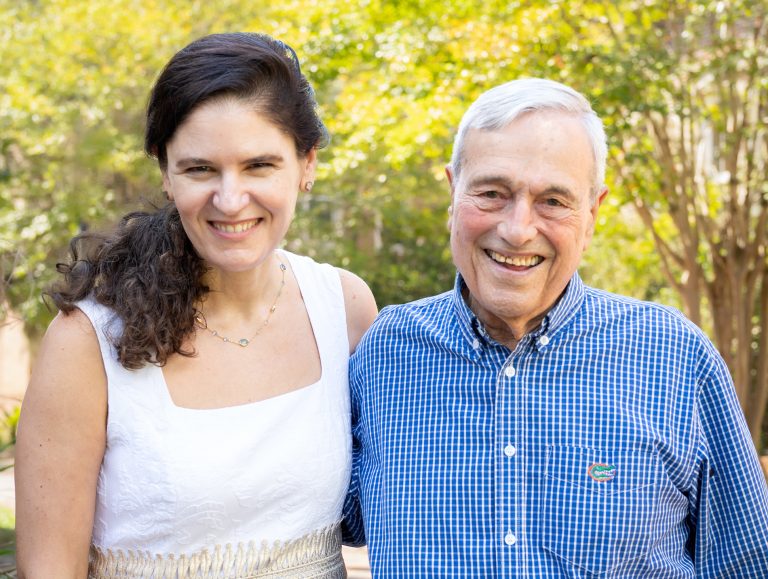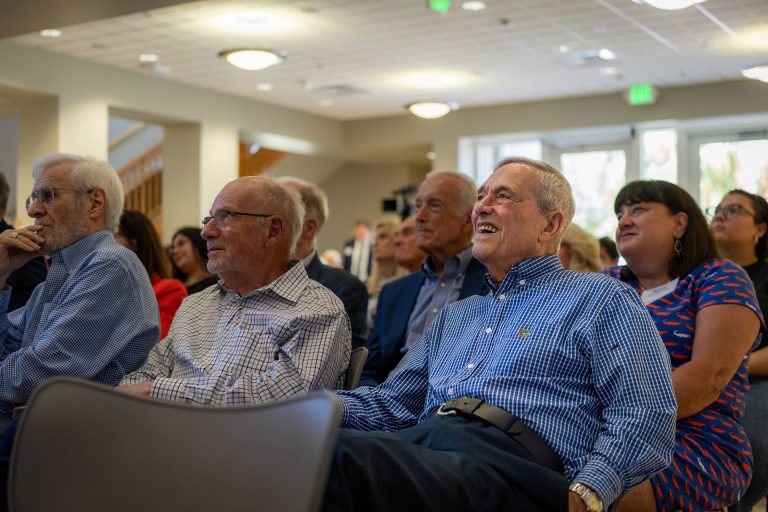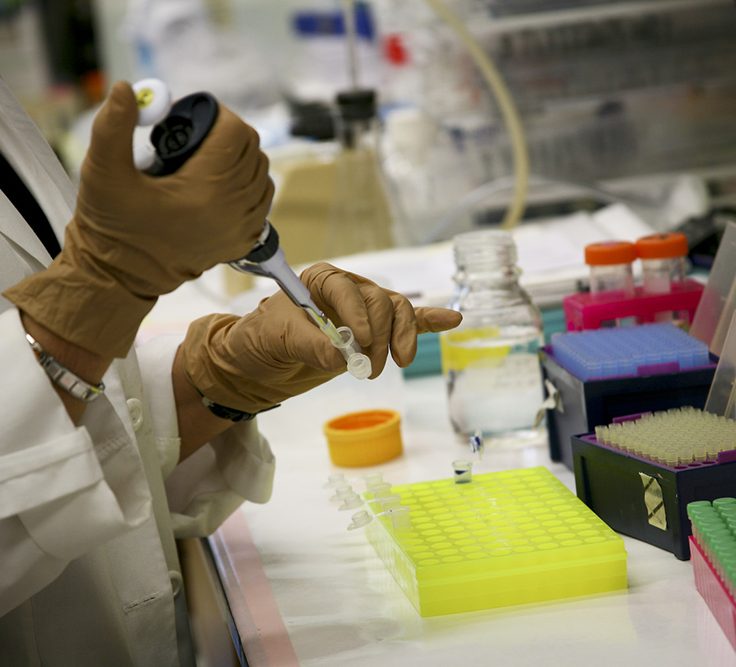
Celebrating 50 years of Jewish Studies at UF
As a vital hub for Jewish thought commemorates 50 years, a transformative gift illuminates the path for a promising future
With a trademark twinkle in his eye, Samuel R. “Bud” Shorstein peered out from his place at a podium before a bustling banquet room in the University of Florida’s Emerson Alumni Hall. “Where better to teach the student body what the Jewish people have to offer?” he mused. Shorstein, a pillar within the local Jewish communities in both Jacksonville and Gainesville, hardly needed to ask the question. The resounding applause from the audience reaffirmed his unwavering belief.
For the past 50 years, UF’s Center for Jewish Studies has thrived as an epicenter for Jewish thought, history, and dialogue. Now attracting more Jewish students than any other university in the United States, UF has evolved into an organic home for this line of academic inquiry.
In an oration more akin to an intimate chat than a speech, Shorstein shared the story of his life and career. It’s a path that took him from a successful accounting firm to the statehouse beside former Gov. Bob Graham, then to Capitol Hill as Graham’s chief of staff in the United States Senate, before coming full circle back to accounting work in Jacksonville as a former partner of Shorstein and Shorstein, P.A.
Throughout the twists and turns of Shorstein’s journey, one constant remained: a fierce love for his alma mater. “My brother Jack was the first to attend UF in 1947,” he fondly recalled. “Since then, there have been more Shorsteins enrolled than not.” On Sept. 7, his multi-generational Gator family gathered with friends, colleagues, and members of the Jewish community to celebrate a momentous occasion.
In recognition of Shorstein’s unwavering support spanning five decades, UF has bestowed upon Shorstein the ultimate honor. On its golden anniversary, the center proudly dons a new name: the Bud Shorstein Center for Jewish Studies.
Anita Zucker, a member of the UF Board of Trustees, expressed gratitude to Shorstein for his transformative generosity. “You are the personification of the Jewish principle of tikkun olam, Hebrew for ‘repairing the world,’” she remarked. “Your commitment and actions have truly made the world a better place.”
Shorstein’s most recent gift will empower the center to expand its programs, attract renowned scholars, and create new opportunities for students, faculty, and the wider community. “We will be able to undertake initiatives about which we could only dream before,” said Norman J.W. Goda, the Norman and Irma Braman Professor of Holocaust Studies and Director of the Shorstein Center. “So much of life is timing,” Goda said. “And the naming of our center comes at a most auspicious time.”
Over the past few years, a group of forward-thinking new faculty has practically transformed the center’s offerings. These world-renowned scholars are filling in the gaps in our knowledge of Jewish tradition, history, culture, and faith. Now, as the world grapples to gain clarity amid recent events in Israel, the center faculty’s expertise shines even brighter, fostering historical awareness and intercultural understanding.
“Our greatest resource is our people,” Goda said. “Our faculty combines first-rate classroom instruction with cutting-edge research on the Jewish experience, from books to articles to documentary films and podcasts.”
As the local community came together to celebrate the center’s naming, UF President Emeritus Bernie Machen emphasized the vital role of the Shorstein Center for Jewish Studies, invoking one of the most crucial lessons of the Holocaust: “Never Forget.” It’s a universal lesson that urges each of us to preserve and learn from the history of great injustices.
“I hope we will never forget,” Machen shared. “I hope we will always remember and always study and investigate, the complexity, the contradictions, the full history of our shared humanity.”
In addition to his recent generous gift, Shorstein has previously supported the Center for Jewish Studies by establishing a professorship and sponsoring writing awards, showcasing his unwavering dedication to advancing the center and the university as a whole.
Shorstein’s nickname “Bud” is a truly fitting moniker. Shorstein Fellow and Assistant Professor Rachel Gordan describes him as a true partner in every sense. Shorstein didn’t merely fund Gordan’s position in American Jewish Culture and Society; he became an ardent friend and supporter. When Gordan moved to Gainesville in 2017, Shorstein went beyond the role of a benefactor, warmly embracing her into the community. He acquainted her with UF sports, took her to local art and music events, and even introduced her to many of his UF fraternity friends.

“He’s someone who really takes his friendships seriously,” Gordan remarked. “It has made this position so much more meaningful to have this unexpected friendship and deep personal relationship, which is not something that I would’ve ever anticipated. I feel very lucky.”
As the center’s faculty look ahead to the possibilities, they remain steadfast in their duty to teach and research the Jewish experience. Both at UF and beyond, the center serves as the bridge connecting generations of Jewish traditions. The Shorstein name will be prominent as the center continues to make Jewish perspectives more engaging and accessible.
“Bud sees us as an integral part of the cultural development and well-being of a large and vibrant Jewish community in Florida,” Goda said. “Knowing that a good friend sees us in this way reminds us every day of our mission and how very lucky we are to be the ones to fulfill it.”
A Unified Purpose
Teaching
Shorstein actively participates in the center’s courses, embodying a commitment to continuous learning. Acknowledging the universal values inherent in the Jewish experience, he emphasizes the continued impact of the center on both Jewish and non-Jewish students. Although particularly popular among Jewish students, the courses attract a diverse enrollment from across the campus. The faculty not only welcomes but celebrates this diversity, aiming to empower all students.
Courses at the center encompass a broad spectrum, from those exploring the diverse history of the Jewish people, such as “Remembering Jewish Baghdad,” to those integrating contemporary events, such as “The Israeli-Arab Conflict on Stage and Screen.” A notable addition this semester is the one-credit course, “What is Israel?” This course gives a wider swath of UF students a chance to gain a holistic understanding of the state of Israel. It aims to provide an unbiased examination of Israel’s complex history, countering misconceptions surrounding the current conflict and providing a more nuanced perspective on the events and dynamics at play in the region. Additionally, the center now offers certificates in Israel Studies, European Jewish Studies, and Holocaust Studies, alongside major and minor programs.
The focus is on offering a comprehensive understanding of Jewish history and culture as well as subjects such as antisemitism and the Holocaust, while building connections to a wide array of disciplines. The faculty actively creates dynamic discussions that are positioned as safe havens for exploration, experimentation, and learning. Ultimately, students enjoy an engaging and interactive space where they can delve into the complexities of Jewish culture and its impact on the global stage.
Public Outreach
Another fundamental aspect of the center’s approach lies in its ability to engage with the broader community. “We are the only program of our kind in the state,” said Goda. “And the only people offering academic programs in this space that feature new research on a variety of topics.” The faculty often travel to schools, synagogues, and community centers throughout the state to educate the public.

Many of the center’s lectures, workshops, and seminars are streamed virtually to encourage those who are geographically dispersed to join in — and recorded, as well, so those unable to attend can watch and learn later. “It’s outreach that overcomes geography,” Goda said.
Off-campus, the center organizes an annual Jewish film festival. It’s hosted at downtown Gainesville’s historic Hippodrome Theatre, drawing in a more diverse section of the local community. “It’s one of the best film festivals in the nation,” Goda said. “We get hold of films that don’t make it into the mainstream.” The festival goes beyond screenings: Discussion sessions with panelists follow each film, enhancing the experience for attendees by providing a chance to engage with experts and discuss the film’s subject matter in depth.
Research
The center is a hub for cutting-edge research and new cultural production on the Jewish experience. Faculty members actively engage in interdisciplinary study, spanning a breadth of disciplines. This blend of expertise invites collaboration and multi-directional inquiry in the research endeavors undertaken at the center.
Students at the center also benefit from substantial financial support. “Thanks to our scholarship endowments,” Goda said, “we have sent UF undergraduates working on honors projects to New York, Madrid, Paris, Berlin, and Jerusalem.” Research scholarships are available for masters and doctoral students, facilitating opportunities for archival research abroad and travel to present their research at international conferences.
The center relies on UF’s Isser and Rae Price Library of Judaica to support the research needs of faculty and students. With over 140,000 volumes, it’s the leading collection in the southeastern United States. The holdings catalog the Jewish experience in over 50 countries and 45 languages. Over 20,000 of the library’s items have been cataloged digitally, enhancing accessibility to these resources. And now, thanks to a National Endowment for the Humanities (NEH) Challenge Grant, the library is currently focused on collecting, preserving, and digitizing hidden and endangered resources from Florida, Latin America, and the Caribbean, further expanding its reach through collaborative partnerships.
Explore the Bud Shorstein Center for Jewish Studies here.
Read more from the Fall/Winter 2023 issue of Ytori magazine.


